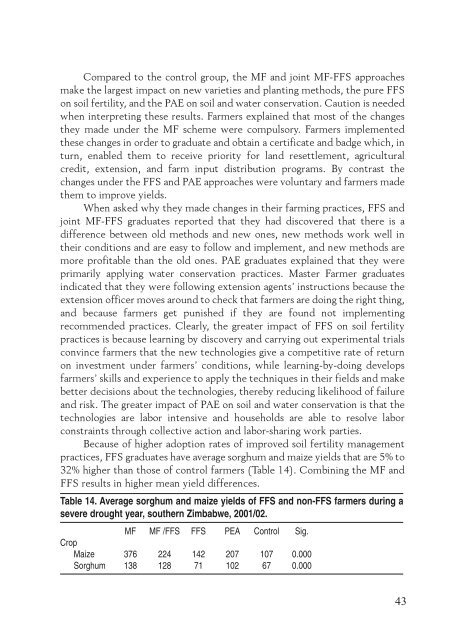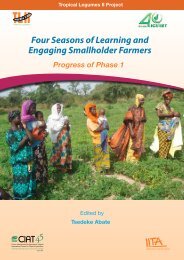Integrated Soil Water and Nutrient Management and Dry ... - Icrisat
Integrated Soil Water and Nutrient Management and Dry ... - Icrisat
Integrated Soil Water and Nutrient Management and Dry ... - Icrisat
You also want an ePaper? Increase the reach of your titles
YUMPU automatically turns print PDFs into web optimized ePapers that Google loves.
Compared to the control group, the MF <strong>and</strong> joint MF-FFS approaches<br />
make the largest impact on new varieties <strong>and</strong> planting methods, the pure FFS<br />
on soil fertility, <strong>and</strong> the PAE on soil <strong>and</strong> water conservation. Caution is needed<br />
when interpreting these results. Farmers explained that most of the changes<br />
they made under the MF scheme were compulsory. Farmers implemented<br />
these changes in order to graduate <strong>and</strong> obtain a certificate <strong>and</strong> badge which, in<br />
turn, enabled them to receive priority for l<strong>and</strong> resettlement, agricultural<br />
credit, extension, <strong>and</strong> farm input distribution programs. By contrast the<br />
changes under the FFS <strong>and</strong> PAE approaches were voluntary <strong>and</strong> farmers made<br />
them to improve yields.<br />
When asked why they made changes in their farming practices, FFS <strong>and</strong><br />
joint MF-FFS graduates reported that they had discovered that there is a<br />
difference between old methods <strong>and</strong> new ones, new methods work well in<br />
their conditions <strong>and</strong> are easy to follow <strong>and</strong> implement, <strong>and</strong> new methods are<br />
more profitable than the old ones. PAE graduates explained that they were<br />
primarily applying water conservation practices. Master Farmer graduates<br />
indicated that they were following extension agents’ instructions because the<br />
extension officer moves around to check that farmers are doing the right thing,<br />
<strong>and</strong> because farmers get punished if they are found not implementing<br />
recommended practices. Clearly, the greater impact of FFS on soil fertility<br />
practices is because learning by discovery <strong>and</strong> carrying out experimental trials<br />
convince farmers that the new technologies give a competitive rate of return<br />
on investment under farmers’ conditions, while learning-by-doing develops<br />
farmers’ skills <strong>and</strong> experience to apply the techniques in their fields <strong>and</strong> make<br />
better decisions about the technologies, thereby reducing likelihood of failure<br />
<strong>and</strong> risk. The greater impact of PAE on soil <strong>and</strong> water conservation is that the<br />
technologies are labor intensive <strong>and</strong> households are able to resolve labor<br />
constraints through collective action <strong>and</strong> labor-sharing work parties.<br />
Because of higher adoption rates of improved soil fertility management<br />
practices, FFS graduates have average sorghum <strong>and</strong> maize yields that are 5% to<br />
32% higher than those of control farmers (Table 14). Combining the MF <strong>and</strong><br />
FFS results in higher mean yield differences.<br />
Table 14. Average sorghum <strong>and</strong> maize yields of FFS <strong>and</strong> non-FFS farmers during a<br />
severe drought year, southern Zimbabwe, 2001/02.<br />
MF MF /FFS FFS PEA Control Sig.<br />
Crop<br />
Maize 376 224 142 207 107 0.000<br />
Sorghum 138 128 71 102 67 0.000<br />
43

















